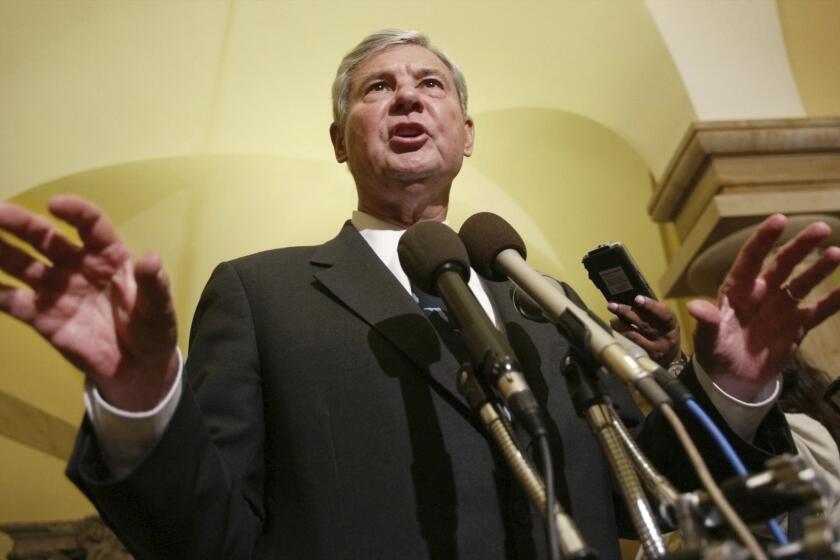Trial Opens for Kim Aide in Ethics Case
Federal prosecutors opened their case against Rep. Jay C. Kim’s former campaign treasurer Wednesday, charging that he brazenly flouted election laws by accepting and concealing illegal contributions in a frantic attempt to raise cash as his boss was coming under increasing scrutiny.
“This is a case about the concealment and cover-up of illegal campaigns contributions,” said Assistant U.S. Atty. Richard Drooyan. Seokuk Ma “knew that corporations could not contribute to candidates in federal elections,” Drooyan added. “He knew that individuals could not contribute more than a nominal amount of cash to candidates in federal elections.”
Ma’s attorney, Sherryl Michaelson, acknowledged in her opening statement that “the evidence will show mistakes were made.” But Michaelson said her client, who was born in South Korea, was “singularly unqualified” to be campaign treasurer in part because he was not made aware of contribution limits and other federal election rules.
Ma, owner of a telecommunications parts supplier and Kim’s treasurer as of April 1994, is the only aide of the Diamond Bar Republican to face charges as a result of a four-year FBI probe of alleged fraud by Kim’s campaign.
Kim, the first Korean American elected to Congress, has not been charged with any wrongdoing. He may be called to testify, but has indicated in court documents that he would take the 5th Amendment on the witness stand.
Drooyan said Ma “covered up Kim’s knowledge of a corporate contribution.” Corporate contributions to federal election campaigns are illegal.
The indictment against Ma charges that he accepted $5,450 from seven corporate donors at a Los Angeles fund-raiser. It also charges that he recruited several people to donate $1,000 each to Kim’s war chest, illegally reimbursed them with his own money, and failed to report it. Ma is also charged with trying to persuade Lola Park, a guest at the Los Angeles fund-raiser, not to testify about a $2,500 auction bid she made at the event, where she bought a framed note signed by the congressman.
Before the trial started, U.S. District Judge Manuel L. Real admonished the lawyers that “this is not a political case, nor is it a racial case.”
When Michaelson indicated that part of her argument was that Ma’s lack of familiarity with U.S. election laws could be linked to his cultural background, the judge snapped, “That’s not a defense. . . . That’s not relevant.”
The first witness called by the government, Lois G. Lerner, a Federal Election Commission official, testified that none of the corporate contributions allegedly received by Ma were reported in the campaign disclosure forms required by the agency. Lerner said the commission sent guides explaining campaign laws to Ma and Kim.
Two other witnesses, a self-employed consultant and a bank branch manager, told the jury that Ma had approached them, asked them to write $1,000 checks to Kim’s campaign, then reimbursed them with checks of his own.
More to Read
Get the L.A. Times Politics newsletter
Deeply reported insights into legislation, politics and policy from Sacramento, Washington and beyond. In your inbox three times per week.
You may occasionally receive promotional content from the Los Angeles Times.






